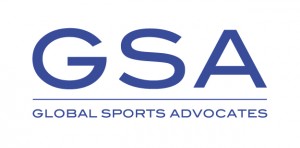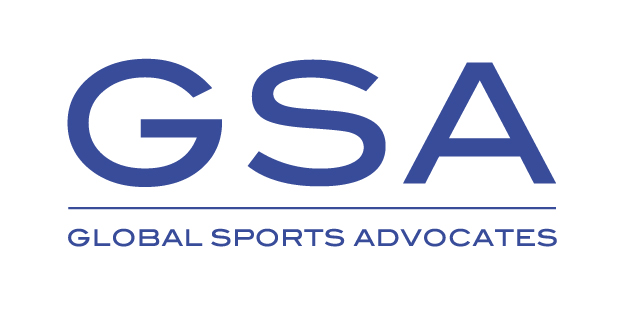The following interview with Paul Greene, Sports Lawyer with Global Sports Advocates, LLC, was conducted by University of Florida Levin College of Law student and aspiring sports law attorney Josh Corriveau. Connect with Paul Greene on his firm’s website and Twitter.

Paul Greene is a graduate of the University of Maine School of Law and is currently a practicing attorney in Portland, Maine. He started his sports career as an award-winning sports broadcaster at a major Maine television station. However, a legal case involving Olympic sprinter Tim Montgomery changed his life. After reading that case, Greene connected with his inner passion for sports law. Last Wednesday, Greene formally announced the opening of Global Sports Advocates, LLC, a firm devoted to the protection of athletes’ rights, the delivery of trusted advice on sports regulation and policy and the management of crisis situations.
During my brief phone interview with Greene what stood out to me was his strong character and the high ethical standards he sets for himself. Although, he has had much success representing U.S. Olympic champions Michael Phelps and Seth Wescott, he still remains humble living by the mantra “always stay true to yourself.” This has helped Greene be recognized as one of America’s leading sports lawyers by Chambers USA in 2011 and 2012; Super Lawyers 2012 and 2013; and as a Rising Star for Entertainment & Sports Law.
Josh Corriveau: You have had an atypical career path. Can you describe how you transformed your career from a sports broadcaster to a sports lawyer?
Paul Greene: My background as a sportscaster was a prelude to sports law. It provided great training to be prepared to represent athletes. And, to effectively communicate with clients, which is something they do not teach you in law school. Also, my communications degree has been valuable. I knew some people in the sports field from my experience as a sportscaster.
Josh Corriveau: What advice has your mentor, Peter Carlisle (sports agent for Octagon), provided you with for pursuing an alternate career in sports?
Paul Greene: Peter was a bridge for me and encouraged me to go to law school in order to have more control of my life. Peter told me your family should always come first and to always stay grounded. That’s why I live in Maine. Living in Portland gives me the ability to stay grounded. Peter also taught me to never forget who you are as a person or to change your core values. These values are what Peter embodies even though he is a top 15 sports agent in the world. These values also help me relate to my clients. In the end, the number one word is trust. You cannot be a poser or someone you are not. You have to be who you are.
Josh Corriveau: You recently opened a sports law firm, Global Sports Advocates, what barriers to entry or challenges do you face? Is a niche specialty practice area necessary to be successful in the sports law field?
Paul Greene: A sports law practice deals with a lot of different things. A sports lawyer could deal with issues relating to a client’s failed drug test, a contract dispute, rights of publicity or a number of other issues. If I encounter an issue where I feel expertise in a certain area beyond my own is needed, I use other lawyers who are specialized in that area. For example, I would send an I.P. issue to Ryan Hilbert (attorney for Sheppard, Mullin, Richter & Hampton LLP), a great lawyer, who specializes in IP law. I do not consider myself a solo practitioner because I have people who I rely on around the country.
Josh Corriveau: Currently, there are no other sports specialized lawyers in Maine, how is this advantageous? How does your location help or hinder you since it is a small city that has a population of 600,000?
Paul Greene: I have had Maine based cases, dealing with Title IX and the rights of student-athletes. The only Maine based athlete I represent is Seth Wescott, a two-time Olympic gold medalist in snowboarding. Most of my clients are not from Maine. I do not think being based in Maine hurts my practice at all.
Josh Corriveau: What is your vision for your firm? Where do you see your firm in 5 years?
Paul Greene: When I first made the decision to do this two months ago, I understood there would be a huge transition period. Setting up a business is a very hard thing to do. It involved setting up a business entity, filing for a federal trademark for my firm’s logo, getting my e-mail address set up, and transferring all current clients over to the new firm. I hope to continue to build my practice steadily and I will reevaluate in 12-18 months. However, I never want to lose my core values of who I am. The problem with getting too big is you can lose that ability.
Josh Corriveau: There has been a major debate whether obtaining a JD or Masters Degree is necessary to be successful in sports representation. What are your thoughts?
Paul Greene: I work a lot alongside sports agents. I think it could be beneficial to have a law degree, but it is not necessary. You are not required to be a practicing attorney. You can be successful without it. But ultimately, it’s hard to understand how to draft a contract without a law degree and it’s even harder to understand that contract when it breaks down.
Josh Corriveau: How did you get your start representing Olympic athletes? Do you believe there is a market for more attorneys?
Paul Greene: Outside the United States and its four major leagues, which are the primary focus here in the U.S., other countries are not as familiar with those sports. For instance, in England soccer (football) and rugby are the primary sports, not pro baseball or pro football. My law practice in a lot of ways more resembles that of a European lawyer since I appear before the Court of Arbitration for Sport. I believe that model is coming to U.S. sports. I think there is going to be a movement towards harmonization of sports disputes, moving away from the current CBA model. The harmonization of sports arbitration under the Court of Arbitration for Sport is how disputes are decided at the Olympics, the World Cup, the Tour De France, and all world championships. I have worked with athletes in all four major sports. The major challenge to representing those athletes is that their union’s lawyers provide representation already. This is different than sports with individual athletes like tennis where there is no union.
Josh Corriveau: What are the major challenges to representing athletes from countries all over the globe?
Paul Greene: The first challenge is getting paid. You have to make sure you accept all currencies in your bank account. And, make sure you are set up to get money wired to your account. The next major challenge is the time zone difference. For instance, to represent an athlete in Australia you must account for the time difference. It is morning there, when it is nighttime here in the U.S. But, things have gotten easier with technology like Google chat, and Skype, which are inexpensive options. Technology has allowed people to represent clients overseas where it wasn’t always possible in the past. It is not so much a challenge to represent athletes from other countries, as it is interesting. For instance, I had a client from Bosnia who was a FIFA agent wrongly denied a transfer fee by a club from Slovakia. I dealt with a lawyer from Slovakia and an Italian arbitrator that made that case very interesting to litigate.
Josh Corriveau: In Caroline Maher v, World Taekwondo Federation, you successfully overturned a wrongful doping ban levied against an Egyptian Athlete by her international federation. What was the crux of that case? What were the legal issues involved and how did you ultimately prevail?
Paul Greene: Amazing case because it had everything. It began with a cold call from a lady in Egypt. She was innocent. Charged without any supporting evidence. The international agency that governs her sport had not complied with the World Anti-Doping Code. She had 21 days to appeal her 2-year ban. She came to me on the 17th day so I filed an appeal immediately. The international agency’s response had nothing to do with the merits of the case, but only argued that her appeal was untimely. This case shows you how to advocate for your client and force the international agency to come out of their cave. They had the burden to show her drug-testing sample had not been tampered with and they couldn’t meet their burden. I flew to Switzerland for the hearing and when I got there, they gave up. A panel of international arbitrators awarded her $20,000 for damages, something that rarely happens. Every year on that date she sends me a message thanking me for changing her life.
Josh Corriveau: You have worked for Michael Phelps and you successfully defended his foundation against cybersquatting. Do you work with Phelps in any other legal capacity?
Paul Greene: Yes, in varying roles. Much of my work with Michael deals with right of publicity issues. It is unbelievable how many unauthorized uses of Michael’s image there are.
Josh Corriveau: With the 2014 Sochi Winter Games now in progress, what legal issues are challenging your clients or other athletes competing in Russia?
Paul Greene: Most of the issues are eligibility cases or immigration type issues. For example, an athlete who competed for Norway and now is trying to compete for another country. I once had a case that dealt with an Olympian from Belarus that later tried to compete for the U.S. There is a 3-year wait period before an athlete can compete for a different country in the Olympics. She tried to compete a week before the 3 year deadline, and the arbitrator held that she couldn’t compete for the U.S. in that Olympics. A harsh ruling in my view, but legally sound.
Josh Corriveau: What advice do you have for law students or others that want to pursue a career in sports?
Paul Greene: In 2005, I was that person. I wrote an article on a case that I thought was interesting and it helped me to talk to people in the industry. You have to pursue your goals and just go for it. You need to come up with something that is unique and that is going to help you standout.
Josh Corriveau: Do you plan to offer internships at your firm? If so, how should interested students reach out?
Paul Greene: I would consider students that reach out to me. I always have room for someone who is valuable.
Josh Corriveau: On behalf of SportsAgentBlog.com and all of our readers, I would like to thank Paul Greene for taking the time out of his schedule to share his experiences and vast knowledge with us today.
